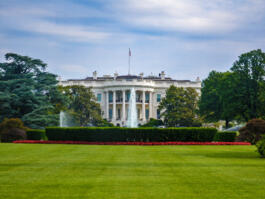Colorado Voters Worry State Becoming Too Crowded
Rapid population growth has transformed Colorado, and most voters in the state say the change is for the worse.
A new telephone and online survey by Rasmussen Reports and NumbersUSA Education & Research Foundation finds that only seven percent (7%) of Colorado Likely Voters want the state’s population, which has doubled since 1980, to continue growing rapidly. Thirty-one percent (31%) want Colorado’s population to grow more slowly, 27% want the population to stay about the same and 32% would like Colorado’s population to become smaller. (To see survey question wording, click here.)
Sixty-three percent (63%) of Colorado voters want state and local governments to restrict development to make it more difficult for people to move to Colorado from other states. And a majority (53%) want the federal government to reduce annual immigration from other countries to slow down Colorado's population growth.
“Voters feel their beloved state is losing many of the attributes that they have most treasured,” said Roy Beck, founder of NumbersUSA, citing voter concerns about the environmental impact of Colorado’s population growth. “Because the political apparatus of Colorado – on both sides of the aisle – is so entrenched with the growth industry, polling in the state rarely asks questions about attitudes toward growth. With the results of this poll, NumbersUSA hopes to educate the media, public and decision-makers in Colorado by drawing attention to the profound distance between public policy and voters' interests about growth.”
(Want a free daily e-mail update? If it’s in the news, it’s in our polls). Rasmussen Reports updates are also available on Twitter or Facebook.
The survey of 1,024 Colorado Likely Voters was conducted on June 12-16, 2022 by Rasmussen Reports and NumbersUSA Education & Research Foundation. The margin of sampling error is +/- 3 percentage points with a 95% level of confidence. Field work for all Rasmussen Reports surveys is conducted by Pulse Opinion Research, LLC. See methodology.
Sixty-one percent (61%) of Colorado voters believe the state has already developed too much. Only eight percent (8%) think Colorado has developed too little, while 31% say it has developed about as much as it should. Majorities of every political category – 64% of Republicans, 57% of Democrats and 62% of voters not affiliated with either major party – believe Colorado has developed too much.
The U.S. Department of Agriculture calculates that Colorado, over the last four decades, has turned more than 1,250 square miles of open space, natural habitat, and agricultural land into housing, shopping malls, streets and other urban development. Sixty-two percent (62%) of Colorado voters believe this has made the state a worse place to live. Only 14% think this development has made Colorado a better place to live, while 19% say the transformation hasn’t had much effect.
Colorado is projected to add another 1.8 million residents by 2050. Eighty-one percent (81%) believe traffic in Colorado will become much worse as a result, while just 13% think the government will be able to build enough extra transportation capacity to accommodate the extra residents without more congestion.
Among other findings of the survey:
– Seventy-eight percent (78%) of Colorado voters believe that, from an environmental standpoint, it is Very Important to preserve their state's mountains, native grasslands, rivers, forests, and canyons.
– Forty-three percent (43%) of Colorado voters believe that legal immigration, which has added an average of about a million new U.S. residents annually, should be reduced to 500,000 or less a year. That includes 22% who think immigration should be reduced to less than 100,000 annually. A majority (61%) of Colorado Republicans want less than 500,000 new immigrants a year, as do 29% of Democrats and 40% of unaffiliated voters.
– Majorities of Republicans (64%), Democrats (50%) and unaffiliated voters (62%) want Colorado’s population either to stay the same size or become smaller.
– While majorities of every political category want to limit the number of people moving to Colorado from other U.S. states, only 33% of Democrats favor reducing immigration to limit the state’s population growth. Seventy-nine percent (79%) of Republicans and 50% of unaffiliated voters in Colorado want the federal government to reduce annual immigration from other countries to slow down the state's population growth.
– Forty-three percent (43%) of Colorado voters were born in the state, while 54% moved there from another state. Among voters who were born in Colorado, 69% want state and local governments to restrict development to make it more difficult for people to move to Colorado from other states, while 59% of those born in another state share the same opinion.
– Sixty-five percent (65%) have sensed in recent years that Colorado's cities, parks, neighborhoods, schools, and roads have become much more crowded.
“The majority of Coloradans wanted to shut down growth to protect the state’s natural attributes that urban growth is devouring,” Beck said. “The bitter fruits of decades of rapid population growth – clogged highways, insufficient rural parking spaces, often-overcrowded trails and parks, urban encroachment on nearby nature areas – have made it more and more annoying and difficult to enjoy the environment that Coloradans treasure.”
Illegal immigration will be an important issue in the midterm elections, according to most voters, who say the problem is getting worse.
A majority of voters have an unfavorable opinion of President Joe Biden, who would lose a rematch election with former President Donald Trump.
Additional information from this survey and a full demographic breakdown are available to the public as well as Platinum Members.
Please sign up for the Rasmussen Reports daily e-mail update (it’s free) or follow us on Facebook. Let us keep you up to date with the latest public opinion news.
The survey of 1,024 Colorado Likely Voters was conducted on June 12-16, 2022 by Rasmussen Reports and NumbersUSA Education & Research Foundation. The margin of sampling error is +/- 3 percentage points with a 95% level of confidence. Field work for all Rasmussen Reports surveys is conducted by Pulse Opinion Research, LLC. See methodology.
Rasmussen Reports is a media company specializing in the collection, publication and distribution of public opinion information.
We conduct public opinion polls on a variety of topics to inform our audience on events in the news and other topics of interest. To ensure editorial control and independence, we pay for the polls ourselves and generate revenue through the sale of subscriptions, sponsorships, and advertising. Nightly polling on politics, business and lifestyle topics provides the content to update the Rasmussen Reports web site many times each day. If it's in the news, it's in our polls. Additionally, the data drives a daily update newsletter and various media outlets across the country.
Some information, including the Rasmussen Reports daily Presidential Tracking Poll and commentaries are available for free to the general public. Subscriptions are available for $4.95 a month or 34.95 a year that provide subscribers with exclusive access to more than 20 stories per week on upcoming elections, consumer confidence, and issues that affect us all. For those who are really into the numbers, Platinum Members can review demographic crosstabs and a full history of our data.
To learn more about our methodology, click here.





